#aboriginal australia
Text
Hey this is really really fucked up. Can we talk about this because holy shit
29K notes
·
View notes
Text
hello, "happy" austr*lia day, here's how you celebrate:
pay each Aboriginal org or individual you see.
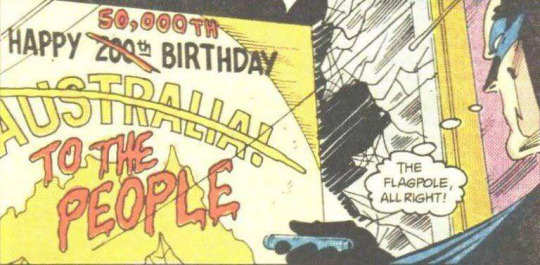
prepping this póst with the consent and supervision of an Aboriginal friend who's taking break from socmedia, i'd like to make it a mútual aïd train type. starting off with some Aboriginal orgs:
Change the Record - reduction of incarceration and violence focusing on community health, growth and stability
Sisters Inside - for incarcerated Aboriginal/TSI Women and Children
Pay The Rent - their slogan is "saying sorry isn't enough"
AIATSIS - focused on language and oral history preservation
The Streets Moviment - building opportunities for Aboriginal/TSI youth
here's a little catch-all article línking a few aforementioned orgs and some more.
Aboriginal folk of tumblr, feel free to add your own bànking accs so settlers can supply you directly. don't worry about the length. austr*lian settlers open your wallets + reblòğ SILENTLY.
mind you austr*lia day fell during general strike for Falasteen this year. assist the Indigenous folk next door as well, while you're at it. Indigenous struggles are all intertwined after all.
#indigenous#indigenous australians#australia#indig aussie#aboriginal#aboriginal australia#australia day#happy australia day#aus day#indigenous australia#color text
2K notes
·
View notes
Text
The end of January is such an important time of the year to support the Indigenous communities in Australia. This link is a good starting point. Please show your solidarity in any and every way you can.
455 notes
·
View notes
Text
Okay apologies for hopping on tag trending train but I have an important request.
If you don't know about the history of Aboriginal genocide in Australia, watch this program.
It's a very very hard watch but one that is important.
If you're outside of Australia, make sure to set your VPN to Aus. You may also need to set an acount for SBS but it's free viewing.
I would also recomend most of SBS's docos through NITV, as they're the National Indigenous broadcast station.
A little update on the warnings before I forget. I'm a little pressed for time so this is from my DM's with someone I've shared with.
I just wanted to give a heads up that the show contains footage of a mourning ceremony (with the grievers's permission from what I remember). There is also a segment where stolen remains are returned to their families but there is no appearence of the remains themselves on screen. From what I can tell/remember these scenes are treated with care and gravitas but I don't think I can be the one to say whether they were treated appropriately. Anything on colonialism is a hard watch, but this doco particularly follows on the unglamourised brutality of the frontier wars as well the lack of recognition on the wars from the Australian government/military and from the wider Australian public. That's on me for not disclosing that properly in the post.
#tw brutality#tw genocide#tw war crimes#Indigenous culture#Aboriginal australia#Aboriginal#documentaries#Australia#australia#colonization#colonialism#doco#docos#the frontiers wars
106 notes
·
View notes
Text
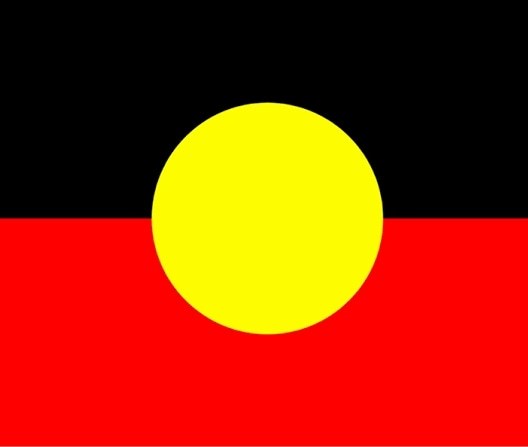
Referendum for the Voice to Parliament returned a No vote and I am messed up
We continue and will fight for much more than what the lukewarm powerless 'Voice to Parliament' ever offered. Not just 'Treaty', Soveriegn Right
#Always was always will be#Soveriegnity waa never cedrx#Aboriginal Australia#Fight now and hereafter continues
13 notes
·
View notes
Photo
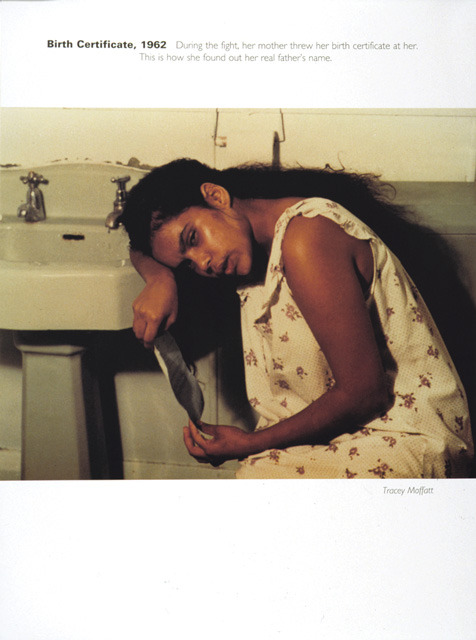



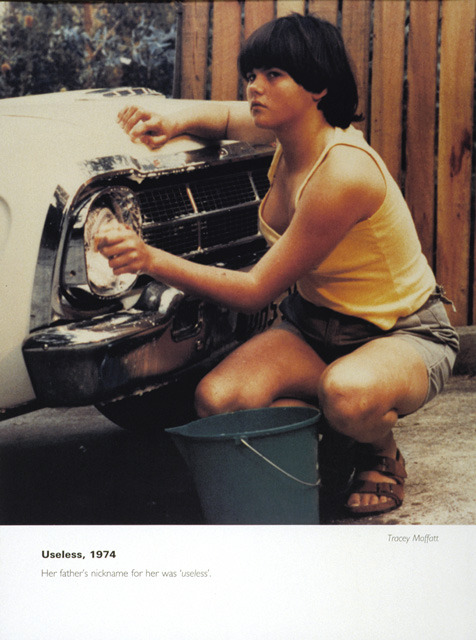

TRACEY MOFFATT
“SCARRED FOR LIFE” (1994)
photo-lithographs
80 x 60 cm (sheets)
27 notes
·
View notes
Text

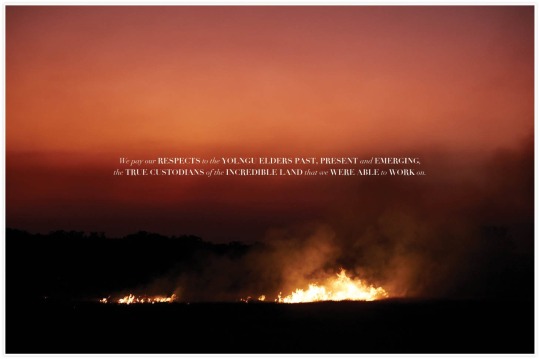


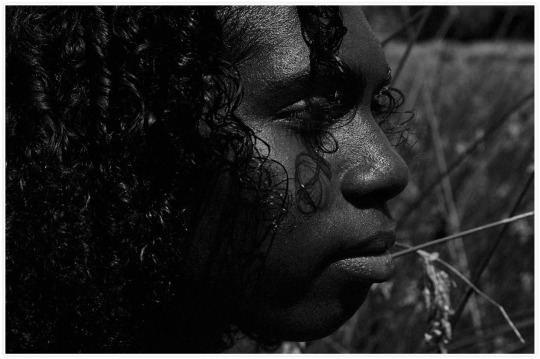

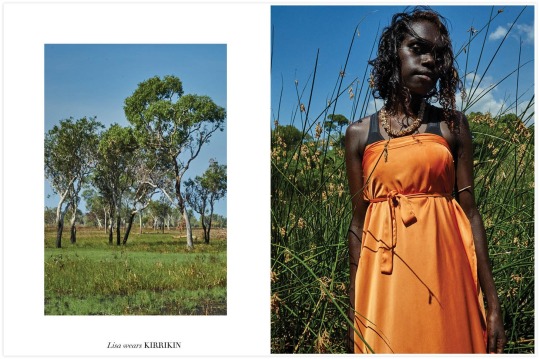


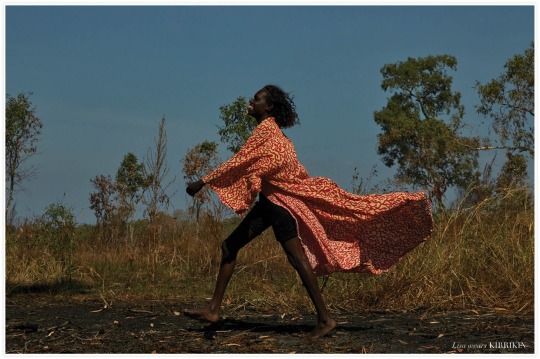
DJANAMIRR YURRIWI feat. Tarlisa Gaykamangu, Lisa Gaykamangu, and Angelica Garrawirrtja for Elbazin Magazine
66 notes
·
View notes
Text
living in australia really fucks with your sense of the scale of human prehistory
because aboriginal people have been here for at least 65,000 years
so when you hear that the oldest cave art in england is 13,000 years old, instead of being awed by the vast expanse of human time and our ability to connect with our ancestors through the art they left behind, you're just like
pshh
only THIRTEEN thousand?
babies
#prehistoric humans#aboriginal australia#original#yes i am aware that the oldest australian rock art is only about 17500 years old what's your point
7 notes
·
View notes
Photo

“Tree” by Aboriginal Australian poet and playwright Kevin Gilbert (1933–1993), published in the 1988 anthology, Inside Black Australia, edited by Gilbert and included among other contemporary Aboriginal poets
#that anthology is seriously interesting i think everyone should check it out#kevin gilbert#influences#black history month#aboriginal australia#poetry#australian poetry#twentieth century
15 notes
·
View notes
Text

Group portrait of Aboriginal women and girls knitting socks, jumpers, and balaclavas for the war effort at Cumeroogunga Government Mission, New South Wales (opposite Barmah, Victoria) on the Murray River. Identified, left to right, back row: Merle Morgan, June Morgan, Weeny Charles, Amy Briggs, Valda McGee, Edna Walker, Sheila Charles, Joan Charles, Elsie Cooper, Midge Walsh, Florry Walker. Front row: Joyce Atkinson, Clare Charles, Alma Charles, Ada Cooper, Nelly Davis?, Elizabeth Morgan, Lauraine Charles, Greta Cooper, Violet Charles, Wynnie Walker, Hilda Walker, Georgina Atkinson, Lydia Morgan, Reta Cooper, Maggie Weston. Photographer: Beatrice Austin, 1941. Source: Courtesy Australian War Memorial: P01562.001.
Taken from the article "'The families were… too poor to send them parcels': the Provision of Comforts to Aboriginal Soldiers in the AIF in WWII" by Kristyn Harmon in the December 2015 issue of Aboriginal History.
21 notes
·
View notes
Text
How We Cleared The Native People From Their Land
The Voice referendum has shone a light on Australia’s interracial relationships between First Nations people and white Australia. The lethargic acceptance by modern Australia of its neglect of its Indigenous population has been woken up somewhat. The majority of Australians of European descent have little to no appreciation of our history when it comes to how we cleared the native people from…

View On WordPress
#Aboriginal Australia#Australia#First Nations#Frontier police#Genocide#Indigenous Australians#Mass Poisonings#Massacres#native police#Queensland#racism#Voice
2 notes
·
View notes
Text
Eyy, so @raptorbricks tagged me for this like a week ago and I'm finally got around to it! Like what Raptorbricks did I added links to the youtube sources of the soungs, plus I added some links to translations for some of the songs.
“Rules: shuffle your ‘on repeat’ playlist and post the first ten tracks, then tag ten people.”
10 songs from my “on repeat” mix on shuffle:
The Bug Collector - Haley Henderickx
Musicawi silt | Getatchew Mekuria & The Ex (You don't need lyrics, just listen to the guitar and saxophone).
The Wisp Sings - Winter Aid
ingerlaliinnaleqaagut - Nanook (Translated Lyrics)
つきをみた (tsukiwomita) - Sohta (想太) | (YT link to an ENG fansub) | (Niconico link here)
Weather - Luck Luster
Kereshmeh; Reng-e Shalakhu (Persia: Ancient era) - Kazem Davoudian and Geoff Knorr | (WARNING PARADOX GAMES OST) (Link to the original Karamesh) (Link to original Reng-e Shalakhu)
ᐃᒥᖅᑕᖅ (Imiqtaq) - Riit | (Translated lyrics)
Dhaliwuy Bay - Yirrmal
Moon is Sharp - Grouper
... I swear I listen to more than just non-english songs and milennial Tiktok music, the algorithm just wanted to expose me.
I might reblog this later to give a quick summery of the context of each song and some of my reccomended videos for getting into non-western music.
Now for the Ten I choose to expose their music taste are...
@grapeagata @broccoli-bitching @crocadilly @enchanteddaydreams @ofals @sock-puppet-dinosaur @tootheyes @justgoji @theolminitiative and @ratbonesart.
No actual obligation to join if you don't want to. However, anyone is free to join in if they want, just make sure to tag me!
#tag game#music#Ethiopian jazz punk#Ethiopian#Greenlandic#Japanese#Nunavut#Iranian#ᐃᒥᖅᑕᖅ#つきをみた#初音ミク#Miku#Vocaloid#Blak artist#indigenous australia#aboriginal australia#always was always will be#Nanook#Hayley Henerickx#Getatchew Mekuria#Getatchew Mekuria & The Ex#想太#Sohta#Luck Luster#Kazem Davoudian#Riit#Yirrmal#Dhaliwuy Bay#Grouper#Moon is Sharp
25 notes
·
View notes
Text
Here are some lyrics about Jan 26 and all it represents, to remind you why we hate it:
"How you wanna raise a flag with a rifle to make us want to celebrate anything but survival?" (From Jan 26 by A.B. Original)
"Why you crying for if it's just only a date? It's a date where all my women got beaten and raped." (From 22 Clan by Mackridge x Barkaa)
"Well, they say that they came in peace, but our blood still stains the beach." (From Bagi-la-m bargan by Birdz)
"Fuck celebrating days made on misery. White Aus still got the black history." (From Jan 26 by A.B. Original)
"Can't colonise my blak mind, I'm from the Dreamtime, I go back. The committed genocide through my tracks, they raped our mothers lessened my black. They brought the violence when they attacked." (From Blak Matriarchy by Barkaa)
"One dark day on Framingham, came and didn't give a damn. My mother cried go get their dad. He came running, fighting mad. Mothers tears were falling down, Dad shaped up and stood his ground. He said "you touch my kids, and you fight me." And they took us from our family. Took us away. They took us away. Snatched from our mothers Brest, said this was for the best, took us away." (From Took the Children Away by Archie Roach)
"Patiently waiting for someone I ain't ever seen before. They say he's the captain of men but don't believe in our law. From the land of the white skin, he's self riteous, a murder without license." (From Bagi-la-m Bargan by Birdz)
If you can listen to all of these songs with an honest and open mind, and you still don't get it, then I'm sorry, but I don't think you've got a functioning heart.
8 notes
·
View notes
Photo

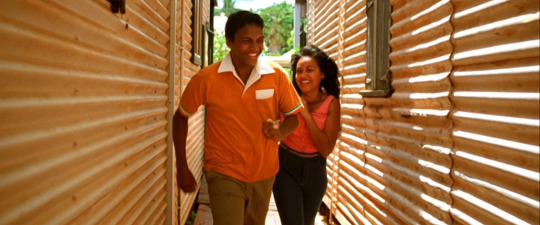



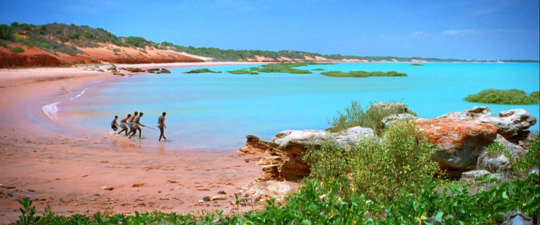

BRAN NUE DAE (2009)
dir. Rachel Perkins
#bran nue dae#mine#wa#brannuedaeedit#aboriginal australia#australian cinema#filmedit#classic literally a classic
24 notes
·
View notes
Text

National Sorry Day - 26th May. National Sorry Day is a day to acknowledge the strength of Stolen Generations Survivors and reflect on how we can all share in the healing process.
The phrase Stolen Generation refers to the countless number of Aboriginal and Torres Strait Islander children who were forcibly removed from their families under government policy and direction. This was active policy during the period from the 1910s into the 1970s, and arguably still continues today under the banner of child protection. It is estimated that during the active period of the policy, between 1 in 10 and 1 in 3 Indigenous children were removed from their families and communities.
The removal of Indigenous children was rationalised by various governments by claiming that it was for their protection and would save them from a life of neglect. A further justification used by the government of the day was that it was believed that “Pure Blood” Aboriginal people would die out and that the “Mixed Blood” children would be able to assimilate into society much easier, this being based on the premise that Aboriginal and Torres Strait Islander peoples were racially inferior to people with Caucasian background.
There were a number of government policies and legislation that allowed for the removal of Aboriginal children. One of the earliest pieces of legislation in relation to the Stolen Generation was the Victorian Aboriginal Protection Act 1869, this legislation allowed the removal of Aboriginal people of mixed descent from Aboriginal Stations or Reserves to force them to assimilate into White Society. In NSW, the Board for the Protection of Aborigines was established in 1883, and this board was initially established to provide ‘the duty of the State to assist in any effort which is being made for the elevation of the race, by affording rudimentary instruction, and by aiding in the cost of maintenance or clothing where necessary, as well as by the grant of land, gifts of boats, or implements of industrial work.’ [1] Prior to 1909, this Board acted without legislative authority. In 1915, the Aborigines Protection Amending Act 1915 (NSW) was introduced, this Act gave the Aborigines’ Protection Board the authority to remove Aboriginal children without having to establish in court that the children were subject to neglect.
Once a child was removed from their family, they were forced to assimilate into the White Society. This included being forbidden to speak their traditional language or participate in any form of cultural practice or activity, and having to adopt new names and identities. Many of these children were informed that their families had either given them up or had died. To increase the success of removal policies, the authorities would often send the children vast distances from their Countries and families. For some of the children that were removed and forced to assimilate into White Society, they developed a shame of their Aboriginal or Torres Strait Islander heritage. For some as they grew older and started their own families, they continued to hide their Aboriginal or Torres Strait Islander heritage from their family, with many not accepting this heritage until much later in life.
Many of the stolen children were placed into group homes such as the Kinchela Boys Home and the Cootamundra Girls Training Home. At these homes the children were taught skills such as housekeeping and farm handing, so that once they were to leave the home, they would be able to be placed into the service of a White family. Whilst in these training homes many of the children experienced neglect and abuse in many forms, including sexual and physical abuse.
In 1969, New South Wales abolished the Aborigines Welfare Board, and this effectively resulted in all States and Territories having repealed legislation that allowed for the removal of Aboriginal children under a policy of ‘protection’.
The practice of removing children continues to this day, research released in 2019 compiled from data from the Australian Institute of Health and Welfare and data from the Western Australia Department of Communities and Department of Health indicate that between 2012 and 2017 the number of Aboriginal Children placed into Out of Home Care rose from 46.6 per 1000 to 56.6 per 1000 children. This research also found that the rate of infants (under 1 year old) placed in to Out of Home Care rose from 24.8 to 29.1 per 1000, between 2013 and 2016 [2].
105 notes
·
View notes